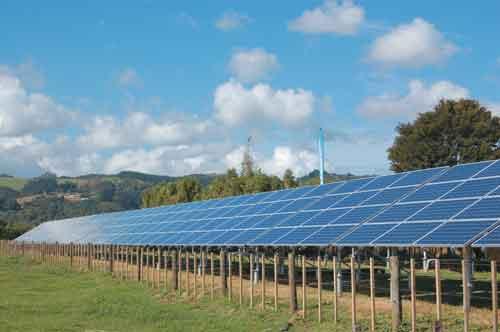Many consider global warming to be a threatening fact, for others it is just a myth. However, businesses throughout the industrialised world are implementing policies and principles of sustainability with renewable resources. South Auckland Forging Engineering Ltd (S.A.F.E Ltd) in Drury has now risen to the challenge of sustainability by installing the largest photovoltaic solar electricity generating array in New Zealand. The official opening of the 68kW solar plant by Dr Paul Hutchinson, MP for Hunua, took place on Friday, 27 April 2012.
S.A.F.E Ltd operates a heavy forging plant, a large heat treatment facility, machine shop, metallurgical laboratory and training programme all on its one three-hectare site, to provide a ‘one stop shop’ integrated manufacturing service. With drop-hammers and forging presses to 1200 tons, S.A.F.E Ltd produces specialised, customised, high-integrity product for most industries in New Zealand. Innovation and capacity expansion is a continual development at S.A.F.E Ltd, with a new process for Titanium forging and extrusion currently under construction.
The solar generation project was launched as a result of S.A.F.E Ltd’s management questioning how to reduce the ever-increasing electricity bill. Changing to a different supplier was investigated, but would only have decreased the bill by two percent. After further research and getting a number of quotes, the economic advantages of installing solar panels proved convincing. But cutting the energy bill was not the only motivation for going solar. Barry Robinson, General Manager, S.A.F.E. Ltd: “I don’t believe in things such as carbon tax and the Emissions Trading Scheme, but I am an absolute green!” How can that work? “I am asking myself: Do we do the right thing for our environment when we pay the carbon tax, or do we just do it to feel better? Does the carbon tax really and significantly reduce CO² emission, or does it only shift production to countries without any emission control, with our planet being much worse off? S.A.F.E. walks the talk and does what matters to keep the environment clean. We have spent a lot of money to install NZ’s largest solar power plant, because we are passionate about our community – our local community, our NZ community and the global community.”
Barry says that S.A.F.E. absolutely believes in sustainability, and the triple bottom line of financial, social and environmental sustainability. “We forge products in steel, aluminium and copper, and soon hopefully titanium. All these metals are indefinitely recyclable. We give back to our community in many ways. We help run the non-profit Maintenance Engineering Society of NZ, we actively support community organisations, and now we run a chunk of our plant on solar energy. When I see our machinery operating and think that the energy required is coming from the sun it really amazes me. We pride ourselves on walking the sustainability talk.”
As part of the opening programme the attendees could witness a hot-forging demonstration in the company’s forging shop. “Hot forging is the strongest and often the most economic method of making a metal product. Steel is heated up to about 1200 degrees Celsius by electromagnetic induction and plastically deformed with a forging press,” explains Barry, and adds, “We also conduct metallurgical investigations here, and we do trainings courses for engineers. We are currently building a new analytical laboratory which will be home to a full-time metallurgist. And for some years we have been contributing to a titanium powder project, which has the potential of adding considerable value to titanium products made in NZ rather than just export the resources we have here in NZ. We are planning to extrude titanium powder into solid products.”
A major advantage of this solar installation is that S.A.F.E Ltd is able to contribute towards sustainable industry in New Zealand, without it being a huge ongoing financial burden to the company. There has been a significant financial investment required (about 250,000 NZD), but there is also a measurable return on investment that is well within the life-span of the solar array. “S.A.F.E Ltd looks forward to progressively innovating in order to secure the future sustainability of the company and its customers,” says Barry.
The 68kW solar array was planned and installed by Ramarama-based What Power Crisis Limited. It features 360 photovoltaic panels from ZG Cells with a maximum generation of 62.4kW. Six inverters change this electricity from DC to AC power required for S.A.F.E Ltd’s heat treatment furnaces, forging plant and CNC machines. Any surplus electricity is fed into the National Grid to be on-sold by Meridian Energy. The solar panels are ground-mounted rather than roof-mounted, and positioned at a 30 degree angle for maximum efficiency.
Obviously solar panels will produce more electricity in summer than in winter, but the solar array is forecast to meet 70 percent of S.A.F.E Ltd’s electrical requirements over a 12-month period. A payback period of eight to nine years, and a return on investment of around nine percent is expected. There are a lot of variables still to be measured and there is some risk associated with increasing lines charges, coupled with reduced buy-back rates. “Meridian Energy has gone some way to reducing the risk with a two-year contract to buy back surplus electricity at the same rate as S.A.F.E Ltd purchases it from them,” says Barry.
For further information contact barry@safegroup.co.nz






